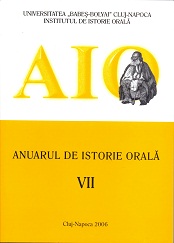HOLOCAUSTUL ÎNTRE ISTORIE ŞI MEMORIE. CÂTEVA CONSIDERAŢII
THE HOLOCAUST – BETWEEN HISTORY AND MEMORY SOME POINTS OF VIEW
Author(s): Doru RadosavSubject(s): History
Published by: Argonaut
Summary/Abstract: Surrounded by a historiography climate, populated with sententious phrases, there is- about the problematic of the Holocaust- a variety of eccentric opinions, from thorough analyses towards interpretations that should be argued by methodical doubts and wise circumspections. Thus, some researchers, historians or philosophers claim that Holocaust should be either entirely history, or memory. From the theoretical point of view the Holocaust may be perceived in the memory plan, from two different perspectives, that express a certain balance between ethics and history, or between history and ethics. The first perspective may be qualified as reprobative - damnatio memoriae, while the second perspective is a historical, reconstituent one - commendatio memoriae. Even though the historiography have brought consistent but not enough contributions to the Holocaust as a historical subject, we state that there should be thought upon the way in which this phenomenon of maximum tragicalness cannot escape memory and get in history, because of the survivors and its singularity and uniqueness that hugely marked the collective memory. Memory and rememorize (not memoralize) of Holocaust individualize themselves in a series of myths that persists in the psychological and historical dimension of the witnesses. Among these we may mention: the passivity, the self-imposed silence, the so-called “syndrome of survivors” (transferring to pathological dimension), the guilt, the defense of the survivor. These myths organize the identity of the victims and induce certain aloofness of those who weren’t in the Holocaust towards the victims of it. Another feature of the Holocaust may be the impossibility of having a global memory, in terms of already being a Jewish memory, a Christian one, so, implicitly a Romanian, a Hungarian, German, Polish one, etc. Holocaust appertaining to memory is induced by the unsaid tendency (theoretically and historiographically) to consecrate the uniqueness of Shoah. In S. Friedlander’s view (Limitele reprezentării. Nazismul şi Soluţia Finală- Limits of Representations. The Nazism and Final Solution), the Shoah cannot be historiographically represented, because there are language limits for reconstituting this kind of tragicalness, limits for representations (the impossibility of reunifying the points of view of the victims, executors and spectators of the Holocaust in a “super-history”), and the past events belong to some limit-situations, so, out of the historical continuum represented by language. As a consequence, the Holocaust must be abandoned to memory and disfavoring history as historiography, because memory is able to establish an authentic relationship to the past, without “completely shutting down historical novel” (Kervin Lee Klein). Opposing to the memory thesis about Holocaust there was established the opinion according to which this phenomenon must “become historic” (M. Foucault considered it to be a building-up of the Nazism...
Journal: Anuarul Institutului de Istorie Orală
- Issue Year: 2006
- Issue No: VII
- Page Range: 5-23
- Page Count: 19
- Language: Romanian

